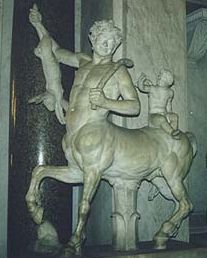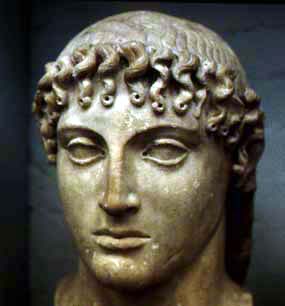Herakles:
Divine and More
![]()
Herakles has always shown that he was fit to be a god, by defeating a variety of enemies who are unstoppable my normal men. His god-like status is further reinforced by the respect he is given by the other gods.
 |
Creatures of
the Gods Herakles’ twelve labors contain some proof of this respect. His first labor was the Nemean lion. This lion had terrified the people and nobody could stop it. From Hesiod’s Theogony, “. . . The Nemean lion, which Hera, the good wife of Zeus, brought up and made to haunt the hills of Nemea, a plague to men. There preyed upon the tribes of her own people and had power over Tretus of Nemea and Apesas: yet the strength of stout Herakles overcame him” (330). |
Also, in this part of Theogony, Hera is said to have brought up the Hydra of Lerna, a many headed, serpent-like beast. Herakles and Iolaus, his companion, destroy it. The poison from the hydra is used by Herakles to tip his arrows. This was Herakles second labor. ‘These labors demonstrate Herakles’ability to voercome creatures associated with the gods.
As an example of the gods’ respect for Herakles, we can go to the third labor. In this labor he is to bring the Hind of Ceyneia, which is owned by Artemis, the goddess of hunting and the moon, back to King Eurystheus. In doing so, he shoots the Hind. As he is walking back with it Apollo and Artemis confront him. Artemis ends up forgiving Herakles and healing the Hind (Apollodorus 2.5.3). If Herakles was a mere mortal, he would have been dispatched quickly by the gods. Instead the gods come together to meet him possibly out of fear and let him go without any punishment. This shows a respect for Herakles, the same respect that the other gods would have gotten.
| The Centaurs The next labor involves the Erymanthian boar also spoken of in the Theogony. The Boar was killing Centaurs and they could not stop it. The Centaurs are offspring of Apollo and are known to use pine trees as their spears (Perseus Encyclopedia). Despite the great strength of the Centaurs they can not stop the Boar. Herakles had no problem he caught it and took it back to Eurystheus. The Centaurs are part god and helpless, Herakles is part god and easily defeated the boar, which shows his power to be as great as a god’s. |
 |
Hephaestus and Hera
The tenth labor also proves Herakles’ prowess.
In this labor he steals the Cattle of Geryon.
In the process he killed two of Poseidon’s sons in fights, more
part-gods easily vanquished by Herakles. Hephaestus,
Hera’s child, watched the herd for Herakles while he looked for runaways.
This shows more respect from a god than any mortal would get.
Of course, Hera sent a gadfly attack to scatter the herd.
This brings us to another point, if Hera hates Herakles so much why not
kill him instead of just pestering him. Perhaps
she can’t and/or is afraid to try.
Atlas
In the final labor Herakles is to steal the Apples of Hesperides.
These apples are known as the source of immortality for the gods.
In completing this labor Herakles fights the son of Ares (Hesiod, Shield
of Herakles). Zeus broke the
fight up before Herakles or Ares could get hurt.
It takes the mightiest of all the gods just to break up a fight with
Herakles. In order to find the
orchard, Herakles roughed up the sea god Nereus.
The god was no match for Herakles and gave him the information.
Herakles then saved Prometheus and he gave Herakles the secret of the
apples. Herakles then had to go and
hold the world for Atlas, so that Atlas could get the apples for Herakles
(Apollodorus 2.5.11). “… he came, at the gates of the ocean, to Atlas, and
held the halls of heaven, he bore up th immortals’ palace splendid with
stars…”(Euripides Herakles 212).
Atlas wanted to take the apples to Eurystheus himself, but Herakles
tricked him into holding the world again. This
shows that Herakles is as strong as a god and smarter than one.
 |
Herakles and
Apollo Padilla, in The Myths of Herakles in Ancient Greece, tells of Herakles’ fight for the Delphic Tripod with Apollo. This is depicted on the Siphnian temple at Delphi. Again, Zeus had to step in and break the fight up. Like Zeus and Apollo, Herakles defeats a serpent. Herakles is allied with Apollo in myth and cult, the fight over the Delphic Tripod was more a rivalry than enmity. Apollo and Herakles are seen as the twins of the Zodiac and both have sungod attributes. Herakles’ punishment for his fight with Apollo was to be sold to the Queen of Lydia, according to Sophocles’ Trachiniae. No mortal would be punished for a fight with a god, because no mortal could survive a fight with a god. |
Other Honors in Myth and
Cult
Padilla also shows Herakles’ godlike status by telling us of Herakles’
presence on the Altar of twelve gods dedicated in the Agora by Peisistratus the
younger. Further, he tells us of pottery that depicts Herakles with
the other gods from Olympus. The
pottery dates from the late 7th to early 6th century.
Padilla goes on to identify Herakles as the god of meat eating because of
his participation in every step of the process (hunting, cattle-stealing,
feasting). In another exploit of
Herakles he shoots Hera with his poison arrow and leaves her with an incurable
pain, is there nobody who can stand up to Herakles, except Zeus.
The Madness of Herakles
Euripides’ Herakles also shows us evidence of Herakles’ great power
and divine actions. “Do you think
Herakles will come back from his chase through the paths underground?
Who has ever returned from the house of dark” (128).
Megara, his wife says this while hoping Herakles will come back and save
her from Lycus. Of course Herakles
does come back from Hades, once again proving his invincibility. “I did. And
dragged Hells watchdog up, three heads and all”(376).
Another of his divine victims is Linus, son of Apollo. “Linus, son of
Apollo- the one who taught Orpheus and, as Herakles’ music tutor attepted to
correct his playing of the lute, provoking the fury of Herakles, who, raging
like an Achilles on the kill, let loose his madness and slew the great
musician… “(141). In another
reference to the Centaurs, Herakles is said to have destroyed with poison arrows
the whole race. Euripides later tells us of Herakles killing a Titan in the war
where the Gods battled with giants. Herakles
would have to be a god to succeed in such a task.
Hera and Herakles
“I refer to the son of Zeus, to Herakles, who was immune until his
labors ended. He’s been under the
shield of Zeus, who wouldn’t let our Hera get the revenge she longed to get.
But now his labors are completed and Hera’s free to prod him into
killing off his progeny and labor him with murder…” (Euripides Herakles
665ff.). This is spoken by Iris,
servant of the gods. Again, if Herakles is no longer protected and Hera can still
only play her games, then Herakles must be as powerful as the gods.
After Hera infects Herakles with his madness the only one who could stop
him is Athena. “Athena, crested
helmet, and like her statue, the spear in hand.
She moved and hurled a rack right at his breast” (820).
This saved Amphitryon, but the children and wife were dead.
Again this illustrates that Herakles can only be stopped by another god.
Herakles in his dismay realizes that Hera is the root of his madness.
Amphitryon tells him, “Let it go, the feud with that goddess, let it
go. All this suffering sits on your
own shoulders, all of it” (940). The
term feud implies equals at battle.
Hesiod’s Shield
of Herakles
“But the father of men and gods was forming another scheme in his heart,
to beget one to defend against destruction gods and men who eat bread” (30).
This shows that Zeus planned to have a powerful child ( a look at
Herakles’ genealogy is provided in another part of this section).
Alcmena, Herakles’ mother, surpassed the tribe of womankind in beauty
and in height; and in wisdom none vied with her of those whom mortal women bore
of union with mortal men” (5). Obviously
Zeus made a good choice in this woman. Further
along in Shield
of Herakles, “And he took his strong spear, painted with shining bronze,
and on his valiant head set a well-made helm of adamant, cunningly wrought,
which fitted closely on the temples; and that guarded the head of god-like
Herakles” (135). Hesiod’s
epithet supports the conclusion that Herakles is godlike.